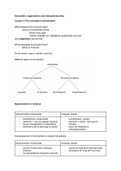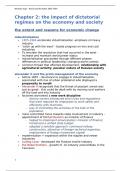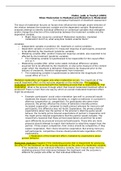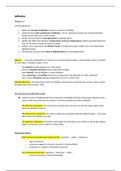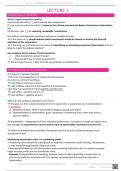Week 1
Concepts of culture / Theories of culture
What is culture? There are three oppositions in theories of culture.
1) Relativist vs. universalist
o Relativist: we must understand the norms and values of a culture as a system in itself,
these norms and values cannot be judged if you are not a part of that culture – Franz
Boas 1858-1942.
According to the relativist perspective, for example a culture such as the Nazi regime in World
War 2 would only be judgeable and accessible according to their own norms. Therefore a new
movement started in thinking about culture the universalist.
o Universalist: proposes norms with a universal character + seeks universal features of
cultures – Universal Declaration of Human Rights 1948.
There are aspects of culture that are universal and that are not restrict to one culture and
therefore we may value or access a culture from these universal aspects.
2) Dynamic vs. static
o Dynamic: what counts as culture is brought about through communication: “a person can
be a member of multiple collective cultures” – Mai Nguyen-Phuong-Mai, p.76.
The culture that is relevant for this moment or this communication is something that you have to
indicate, it is brought about by participants in a particular communication situation.
o Static: what counts as culture can be predicted from a person’s background.
According to the static view of culture, you can say Dutch people are ‘like this’ and German
people are ‘like that’.
3) Culture as shared knowledge vs. culture as socially distributed knowledge
o Shared knowledge: “a society‘s culture consists of whatever it is one has to know or
believe in order to operate in a manner acceptable to its members and do so in any role
that they accept for any of themselves” – Ward Goodenough 1957.
Members of a culture share certain knowledge or believes, but there is a possible problem of this
definition: every member of a cultural group is supposed to have to same knowledge. “Culture is
a set of evolving man-made elements that have increased the probability of survival and thus
become shared among those who communicate with each other” – Mai Nguyen-Phuong-Mai,
p.18. This leads to an alternative culture as socially distributed knowledge.
o Socially distributed knowledge: some members of the culture knows A, others know B.
This makes them able to collaborate and do things together that they could not have done alone,
which makes it a culture: culture emerges as people do things together. Behaviour is based on
culture and produces culture at the same time.
Language plays a role for culture. It is a means to relate to the world, to others and to ‘self’ in
relation to the world and others. From the ‘social distribution’ perspective, language is indispensable
to perform activities with others. Language and language choice can be constitutive of communities
and boundaries.




